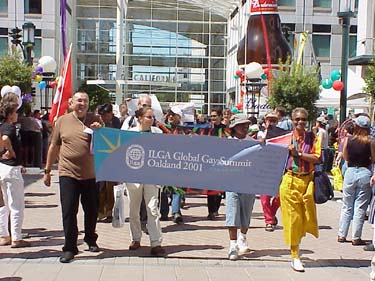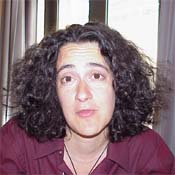 in Oakland, California 40 Countries Represented - a Gay United Nations International Lesbian & Gay Association Delegates |
|
By Rex Wockner International News Report Oakland, California--It was like a gay United Nations. About 100 GLBT leaders from 40 countries converged on Oakland August 27 to September 2 for the 21st world conference of the International Lesbian and Gay Association (ILGA).

Delegates march from Oakland's State of California building to City Hall to protest ILGA's exclusion from the World Conference Against Racism, which began Aug. 31 in Durban, South Africa. Photo by Rex Wockner Delegates came from Argentina, Australia, Chile, China, Costa Rica, Estonia, Ecuador, Guatemala, India, Jamaica, Lebanon, Malaysia, Mexico, Nepal, New Zealand, Pakistan, Paraguay, Peru, Romania, Russia, the Philippines, Poland, Slovakia, South Africa, Sri Lanka, Venezuela and Zimbabwe -- as well as from several Western European nations, Canada and the USA. "ILGA used to be very Eurocentric," said Secretary General Kursad Kahramanoglu. "There are as many non-Europeans as Europeans here this year. In the past, even when ILGA world conferences were outside of Europe, we only had European [attendees]. This year they're not overwhelming the conference." Held at Oakland's Federal Building, State Building and City Hall, the conference was greeted by Mayor Jerry Brown, the former California governor and U.S. presidential candidate. "I really appreciate your work," Brown said at a gala reception in the City Hall rotunda. "I join in solidarity with you for those that are not here but are suffering the ravages and the prejudice of homophobia and discrimination in violation of human rights in this country and often, even more so, in different places -- [in hopes] that this gathering and our collective power will turn the tide till someday justice rules for everyone whether it's gay, lesbian, transgender, bisexual, black, Latino, Asian, whatever. Ultimately the human family has to come together."
"I come away with heightened sensitivity toward struggles beyond my own in this nation, beyond my chosen organizations," Rothschild said. "I come away with political partnerships. It's rejuvenating. It strengthens our work when we go back home. We build teams of advocates for different kinds of work, and that feels particularly compelling." Which is not to say ILGA has not always been disorganized, poor and rife with political disagreement. "ILGA is so anarchic and chaotic," said Ashok Row Kavi, India's most well-known and outspoken gay activist. "The Europeans are too wary of handing too much power to the Latin Americans and the Asians. In India, we've been working on a rather large network, just like ILGA, and it's about as bad as ILGA -- organizing Indians. Get three Indians and you have three political parties." The conference reflected ILGA's disorganization. Attendance was down, some scheduled workshops did not take place, delegates had trouble finding meeting rooms, some sessions degenerated into bickering, and security guards at the Federal Building, where the bulk of the sessions took place, claimed to be unaware of the gathering and confiscated journalists' cameras as a threat to national security.
Given that its primary function has been as a networking tool for far-flung GLBT activists, ILGA faces competition from the Internet as well. "We can do in one second things that some years ago took weeks or months, like, for example, the case of the 52 men jailed in Egypt for being in a gay bar," Petit said. "The Egyptian government had to shut down its e-mail system because of the thousands and thousands of messages of protest and solidarity from gay and lesbian activists around the world." Oscar Atadero, president of ProGay, the Progressive Organization of Gays in The Philippines, believes ILGA could regain some of its former "luster" by reaching out even more to Third World GLBTs. "As an organization, ILGA is a mess," Atadero said. "But, for me, it's very empowering to see lots more delegates from the Third World. We're making our voices heard. I think ILGA has lost a little luster over the years. My unsolicited advice is that if it really wants to reinvigorate or reinvent its importance, there should be more ILGA conferences outside the developed world. ILGA can make huge waves in developing country capitals. These are where the reaction, the conservatism, the violence against gays are on-going and still not addressed. Putting the conferences outside the developed world would inject new blood and a new mission for ILGA. Here [in the developed world], I think it's kind of blown itself out."
Kim's group, Beijing Sisters, has four members. She asked that her last name not be published. Delegate Tariq, from Pakistan, hardly knew what to think. He'd never before been outside of Pakistan, an Islamic nation where gay life is limited to extremely cautious cruising in parks and hotel lobbies. He found ILGA on the Web and they invited him to the conference. To have any kind of gay organization in Pakistan -- political or social -- would be "dangerous and impossible," he said, "due to tradition and religious and legal systems." Do he and what he described as his "little number of" gay friends have private parties? "Impossible," he said. "Legally, it is sanctioned." When a reporter offered to take Tariq across the bay and show him San Francisco's gay Castro neighborhood, he seemed troubled at the suggestion unless the reporter had some "contacts" there. Although attendance was down significantly at this year's ILGA conference compared with the group's large European confabs in the late 80s and early 90s, a 2003 gathering is scheduled for Manila, in the Philippines. That gathering could draw greater numbers if, as some European delegates suggested, the low turnout this year can be blamed primarily on the bad exchange rate on the U.S. dollar for Western Europeans. Delegates from Third World and former communist nations usually attend ILGA conferences on scholarships while delegates from the developed world tend to pay their own way. For more information on the Manila conference or other ILGA activities, e-mail ilga@ilga.org. |



